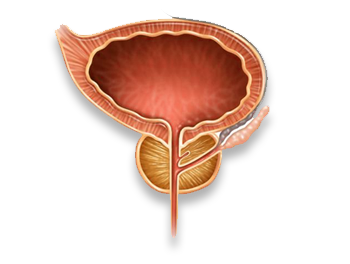Prostate Cancer
What is Prostate Cancer? What are the Causes and Risk Factors of Prostate Cancer? Information on Prevention of Prostate Cancer
Prostate cancer is the most common organ cancer among men and the second most common type of cancer in the world. It is estimated that approximately one in every 6 men will develop prostate cancer and one in every 38 men will die from this disease. Every year around the world, 899,000 new prostate cancer cases are detected and 258,000 people lose their lives from prostate cancer. It is anticipated that, by 2030s, the number of new prostate cancer cases will have increased to 1,700,000 and 499,000 patients will be losing their lives from prostate cancer. However, early diagnosis of prostate cancer is possible with PSA (prostate-specific antigen) test.

Prostate cancer diagnosis
Prostate cancer may generally be asymptomatic until advanced stages. It is mostly detected with elevated level of serum PSA as suggested by the PSA test and also rectal examination. During rectal examination, an urologist will check if there is any hardness or irregularity on the outer surface of the prostate, which might be indicative of a tumor. In 25 percent of the patients diagnosed with prostate cancer, the diagnosis is established with hardness or irregularity detected during digital rectal examination even though the PSA level is within reference range. For this reason, all men aged over 40 must visit an urologist once a year.
PSA Test
PSA is an enzyme secreted by the prostate gland in men, liquefying sperm. Basically, it is secreted by the cells lining the inside of the prostatic ducts. PSA is mostly a prostate-specific enzyme; however, it is also secreted in very low amounts by pancreas and salivary glands. The PSA concentration in the sperm is a million times greater than its level in the blood. Elevated level of PSA is significant in terms of prostate cancer, but it is not specific to prostate only. PSA level may be elevated in benign prostatic hyperplasia and prostate inflammations, as well.
Signs and symptoms of prostate cancer
Prostate cancer is a disease that may progress rather insidiously. While the disease may be symptomless, patients may refer to a specialist with certain complaints, such as problems with urinating, blood in seminal fluid or urine, and pain in the back, waist, hips and thighs. Problems with urinating may include inability to urinate, difficulty starting or pausing urination, frequent urination, the urge to urinate at night, weak urine flow, interrupted urine flow with difficulty, and pain during urinating. Such symptoms and signs may also be associated with non-cancer conditions (such as prostatic hyperplasia, infection). Prostate cancer may progress rather insidiously and be completely asymptomatic during early stages. Therefore, it may progress rather insidiously. In the United States, the autopsies of 40-year-old people who died in a traffic accident revealed prostate cancer.
Prostate cancer and nutrition
Prostate cancer and diet
The most substantial evidence to the role of diet in development of prostate cancer is the higher prevalence of prostate cancer among the people of Japanese and Chinese descent in the United States than among their ascendants. Studies conducted have found out that increased consumption of fat is associated with higher prevalence of prostate cancer and higher mortality. However, there are also studies suggesting that increased consumption of fat has no effect on development of prostate cancer.
Prostate cancer and obesity
Prostate cancer rates go higher as the body mass index increases. In obese people, Psa levels drop and more aggressive and deadly forms of prostate cancers may develop.
Prostate cancer and lycopene
Lycopene is a strong antioxidant found in plenty amounts in tomato and its products. It is suggested that lycopene reduces the risk of prostate cancer. Studies carried out have found that people who consume higher amounts of tomatoes have 11% lower risk of developing prostate cancer than people who consume the least.
Prostate cancer and lycopene
Lycopene is a strong antioxidant found in plenty amounts in tomato and its products. It is suggested that lycopene reduces the risk of prostate cancer. Studies carried out have found that people who consume higher amounts of tomatoes have 11% lower risk of developing prostate cancer than people who consume the least.
Prostate cancer and soy
Soy beans contain high amounts of phytoestrogen, a plant-based estrogen. Phytoestrogen inhibits alpha reductase enzyme and prevents activity of male hormones (androgen). Men who consume higher amounts of soy have reduced risk of prostate cancer. The lower prevalence of prostate cancer among Asian men is attributed to high consumption of soy.
Prostate cancer and green tea
In experimental studies conducted, catechin found in green tea has been shown to destroy prostate cancer cells and stop development of cancer cells. Lower rates of prostate cancer among Asian people is attributed to consumption of green tea in high amounts.
Prostate cancer and vitamin D
Vitamin D is produced in the body through diet and sunlight activating the inactive Vitamin D in the skin. There are several observations and studies on the effect of Vitamin D on prostate cancer:
- People in Northern European countries are exposed to less sunlight; and rate of mortality from prostate cancer is high is those countries.
- Prostate cancer is more common in old age. Vitamin D levels drop with increasing age.
- The melanin pigment in the skin of dark-colored people block the ultraviolet light, preventing activation of Vitamin D in the skin. Colored people have the highest prevalence and mortality of prostate cancer in the world.
- It has been found that people who eat calcium-rich diets have reduced levels of Vitamin D in their blood and increased risk of prostate cancer.
- Since Japanese people have a fish-rich diet, their intake of Vitamin D is high. Japanese men have relatively low rate of prostate cancer.
- Studies conducted show that prostate cancer cells have Vitamin D receptors and Vitamin D inhibits development of prostate cancer cells and prevents them from spreading.
Book an Appointment with Dr. Fatih Atug
Cantact Dr. Fatih Atug
Fatih Atug, M.D.
Urologist and Robotic Surgery Specialist
hidden +90 212 234 5958
hidden +90 532 234 5504
hidden info@fatihatugmd.com
hidden Harbiye Mahallesi, Maçka Caddesi,
Bahriye Apt. No:13 D: 3
Şişli / İSTANBUL
 |
 |
 |




